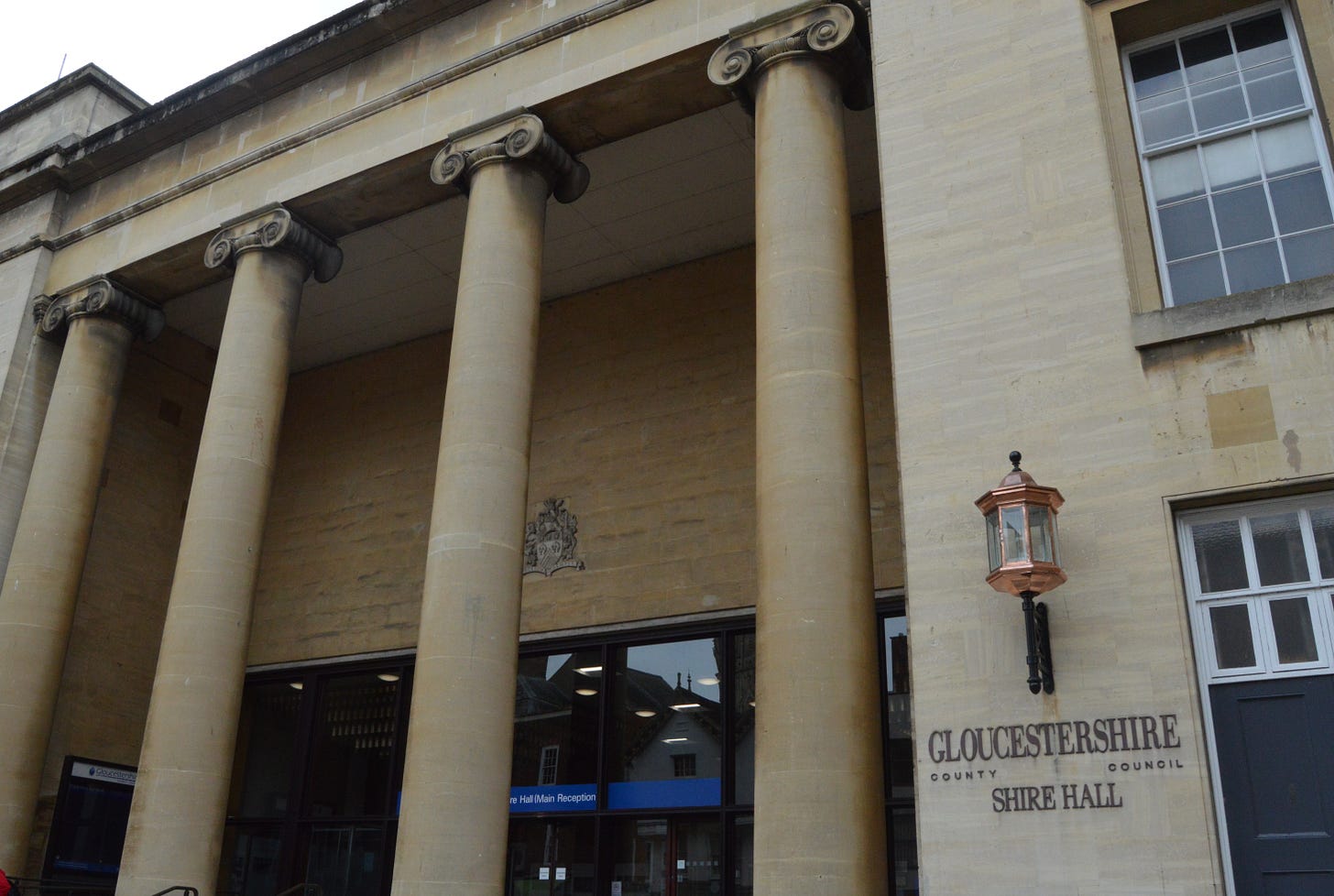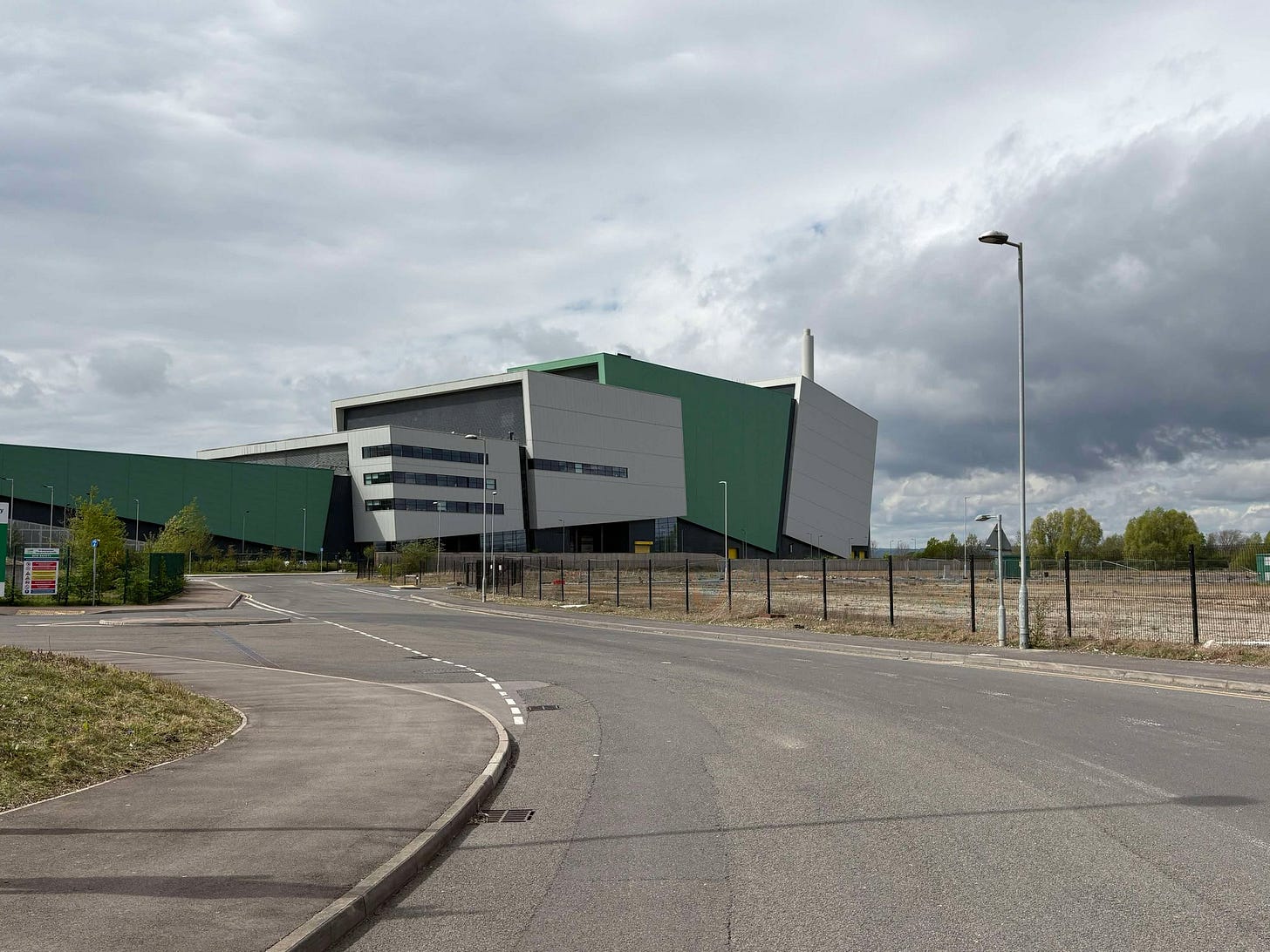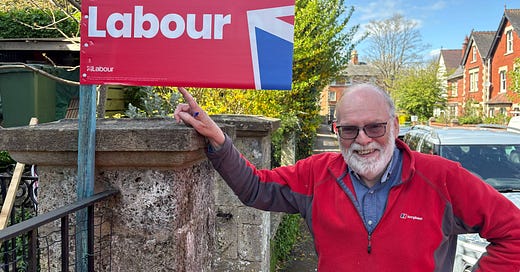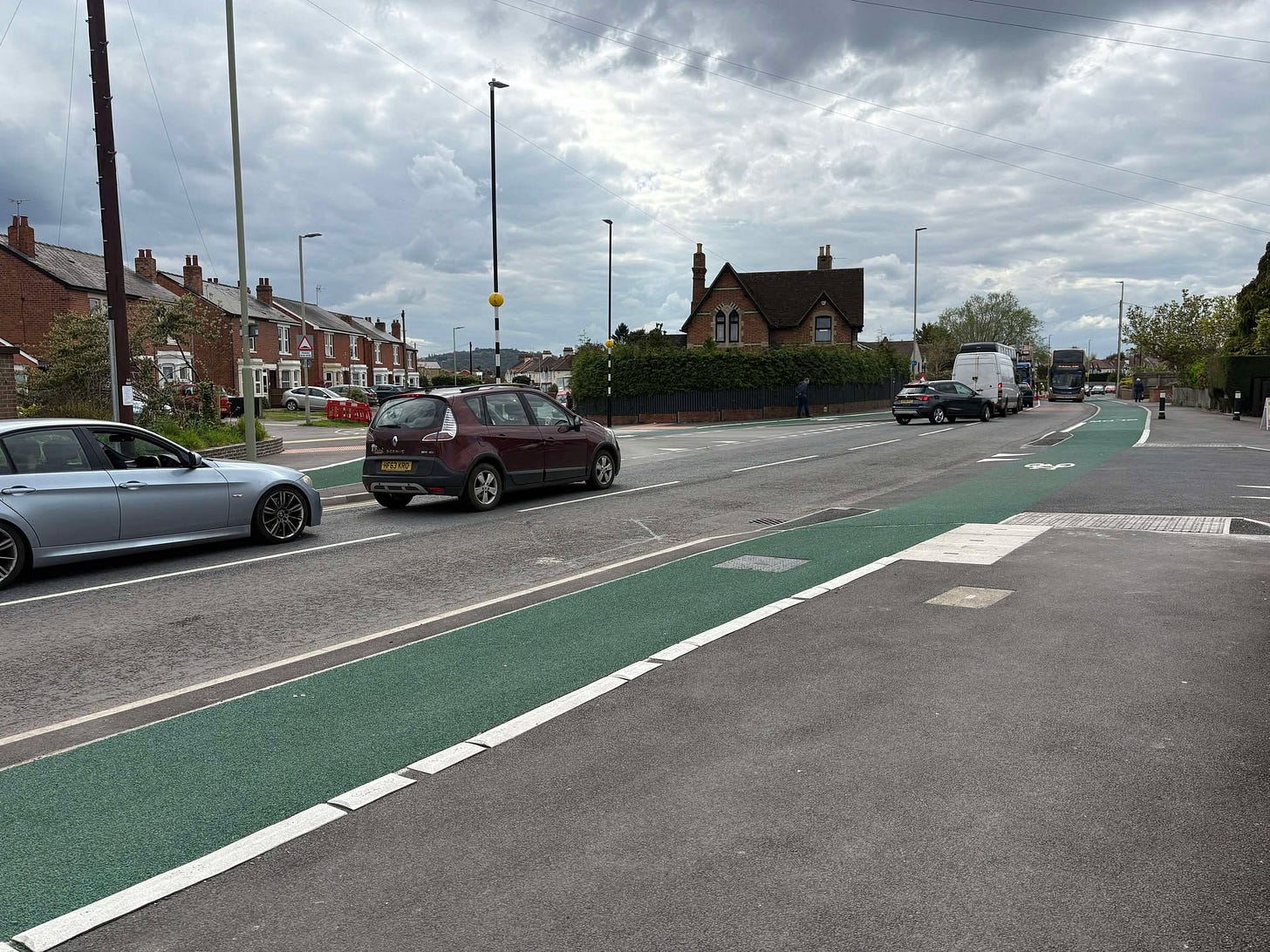Local election leader interviews: Labour
In the final interview, John Bloxsom speaks for the Labour Party on the upcoming Gloucestershire County Council elections
May 1st has almost arrived and finally this is the last county council leader interview.
Five interviewees representing the political parties, plus one representative hoping to form a strong group of independent councillors, have committed a time and place for me to ask questions - I do so on behalf of you, the Gloucestershire public.
This is your local election, your vote. Not every topic will be covered but contained in each interview are questions you the voter would like to have answers to.
Each interview focuses on the services Gloucestershire County Council provides as well as expectations and why you may consider voting either Conservative, Labour, Lib Dem, Green, Reform UK or an independent.
My sixth and final interview representing the Labour Party to speak on Gloucestershire wide issues is John Bloxsom.
John was elected as Labour councillor to the Rodborough division in Stroud four years ago. 2021 saw the party win five council seats and at the general election last year, Gloucester, Stroud and the Forest of Dean all turned from blue to red.
Gaining these seats from the Conservatives paved a path for Keir Starmer to become Prime Minister, a Labour government with an enormous landslide majority.
The honeymoon period is now over though. All governments whether they are Conservative, Labour or a coalition become unpopular instantly, that is the nature of politics, but how unpopular you think this current government is, is for you the voters to decide not me.
National Insurance increases for employers, inheritance tax changes for farmers, cuts to the welfare state, a feeling this is austerity 2.0 - things are not entirely comfortable for Labour nationally, so could it affect how the party fares in Gloucestershire?
“We do want to regain our Gloucester seats at county council but we have not had elections since 2021, a time when the Conservatives did have a post-Brexit bounce, John tells me. We are hopeful that we can gain ground but there are new boundaries which makes it a challenge. We have candidates standing as people who have connections to their communities.”
Just like the general election last year, Labour sees Gloucester, Stroud and the Forest of Dean as the areas where they can win. “Primarily this election should be about local issues but national issues do come up even though county council does not control national topics. We are standing on our own track record locally, but nationally we feel we are reversing 14 years of Conservative government damage. Clearly when a party is not in government it is easy to criticise as Labour did in opposition, but now in government the party must take responsibility for making difficult decisions which are not straightforward.”
One party needs 28 seats to control Shire Hall and if that number is not reached, John says working with other parties, “depends on the numbers so we can form a stable administration. We could work with a joint administration, we could have a confidence and supply arrangement but we can abstain on key votes if we disagree. No Labour candidate is campaigning on the basis we are going to be coalition partners with another party because there are no electoral deals.”
On a very quick point, are things also fractured regionally for Labour?
Former Stroud MP David Drew resigned as a county, district and town councillor last month citing a “deep disappointment and frustration that Gloucestershire will be again in the slow lane when it comes to Local Government Reorganisation. Unfortunately my relationship with the regional office of the Labour Party is completely fractured.”
Mr Drew did say he retains “support, trust and loyalty to Stroud Labour Party members” and newly elected MP Dr Simon Opher, but are things really ok? No matter if it is local or regional, surely public knowledge of internal party divisions damages voter confidence?
“We do remain very grateful for David’s service as a councillor, John says. I know some in Stroud remain supportive of him and he has done a good stint. His comments were about the regional office and none of us in Stroud had any issue with him locally.”
Should these elections even be going ahead?
The Labour government are pushing all areas of England to merge areas where there are currently two tiers of local authority, a brand new ‘unitary’ council is on the cards for the county. It means councils such as Stroud District, Cheltenham Borough and Gloucestershire County Council will not exist for much longer.
One suggestion of splitting Gloucestershire in two saw a backlash, which means there is no agreement politically on a way forward. Gloucestershire Liberal Democrats wanted these elections to go ahead but as one voter tells me, “what is the point in voting if county council won’t exist for much longer?”
John explains that Labour are willing to campaign to gain re-election and in answer to the question, “yes they should be going ahead because four years is the minimum and while we may have a new unitary, new elections will likely be in 2027 and could also not be until 2028 so two to three years more of county council existing, these elections are right to go ahead.”

What to do about Javelin Park?
There are claims by the Greens that it has cost taxpayers more than landfill, £42m over its first five years. The council has said the incinerator has generated tens of millions of pounds in income to help fund public services. It may not be clean money but if it generates money to keep council finances afloat, is it really a big problem?
John says, “you must look at the expenditure of the incinerator. We saw from Ukraine that energy prices really spiked, so that is why more income came in. Income will likely go down in my view but payments to the contractor need to be investigated. We are paying public money to the contractor so the income will fluctuate due to energy market prices.”
John adds: “There has been a policy to stop landfill by this council but I think that is now irrelevant. The council is now bound to the contract, it is not able to terminate it but environmentally I would like us to promote more recycling using alternatives to both landfill and incineration.”
On Net Zero, John says it requires “a transformation in industry, transport, energy, and the challenge is changing people’s lifestyles. Driving down our carbon emissions is not just in the hands of county council but all of us to make a difference.
Gloucestershire County Council has a leadership role here and I would like us to do more on supporting households to help families onto energy efficiency programmes. We need to target communities where it is difficult to keep heat in during colder months and I do believe the local target is doable.”

The county council set a net zero target by 2045 and to reduce emissions by 80% by 2030. There is however an argument on why the UK is ‘racing’ to net zero alone when other countries are not really achieving the goal, an attitude John says is not correct to have.
“It is for our national security and energy policy. If you see what has happened in Ukraine, you could not have had a clear message on what the country needs to do. We need to stop being dependent on Russia’s oil and gas and being energy self-sufficient is not a bad thing to achieve. We need to generate and use renewable energy and if we do this in Gloucestershire alone and nationally, we will not just be in an environmentally strong position but also strategically and financially with new job opportunities.”
Potholes, M5 junctions, cycle spine and road safety
Potholes
On potholes, John says: “We should have tested the market when the Ringway contract was extended and clearly, we need an adequate programme of long-term maintenance rather than short-term reaction resurfacing and filling potholes.”
“What we would like to see is maintaining projects and seeing roads improved. I also think the layout and design of side roads needs to be made safer for walkers and cyclists as well. Making sure there is a better quality of life for more walking and cycling needs to be part of an investment. It should be incumbent on any administration regardless of party to have a rolling programme of repairs and I think everyone across the council chamber wants to see this.”
M5 Junctions 9, 10, 12 and 14
“Working with Tewkesbury and Cheltenham Borough Council, National Highways and Homes England, developing the junctions are vital to unlock growth in the county so I back the progress of the plans on J9 and J10,” John tells me.
On Junctions 12 and 14, John accepts the Green led minority council has had challenges but devolution will solve the issue. He says, “we do need to look at whether the county can pursue developing the junctions, but clearly a bigger combined unitary authority would take on the role of highways and housing at the same time. Upgrading the junctions is a link between housing, growth, and economic development so it is vital infrastructure we would like to see supported.”
Cycle spine
The £48 million project will be a 26-mile long cycling and walking route connecting Stroud in the south to Bishop’s Cleeve in the north, including Gloucester and Cheltenham.
Residents on Evesham Road in Cheltenham, say the changes have made access to their homes too narrow and that they are forced into the opposite lane because of a tight turning angle when turning left out of their homes.
John says the appropriate word here is “difficulty, because I know some people are for it but some are against. Getting it completed in fragments means it is yet to be completed and the stretch of the spine to Stonehouse I know will be tricky. I really do not think it is clear how many people are going to benefit from the project.”
“What we supported is to have more local cycle schemes, so in each neighbourhood there should be schemes to make it safer to cycle and walk. We have also questioned the county council on the standard they have to use for the structure of the spine because the previous government said that if councils used this standard more funding would be forthcoming and I do not believe it has.”
John adds: “It will be many years before it gets any feasibility studies but I think the segregation between the road space allocated has been a challenge. There are cars trying to get along narrower roads now but what is done is done.”
Speeding and 20mph
Voters have told me they will cast their ballot on whether candidates can guarantee concrete support for helping their community solve speeding issues. A Cotswold villager has told me they would like the next administration to help their community implement a 20mph limit.
There was a record number of road casualties in Gloucestershire in 2023, despite numbers falling across Britain. Provisional figures from the Department for Transport suggested there were 1,463 road casualties in Gloucestershire in 2023 – a 19% rise from 1,230 the year before. This was the highest figure recorded in the last 10 years. No matter the year, one casualty is one too many surely?
“We have taken the position that the default speed limit should be 20 and not 30 but only in areas where there are vulnerable road users, John explains. Where it is currently 30 you do have to go through a complex legal and economic process that takes forever.”
“Our preference is the default speed should be the other way around. We would not want to see 20mph limits imposed everywhere but we do need to make it easier for communities to walk and cycle. If you take my council division in Rodborough, we have some busy roads where people do not feel safe crossing the main road, that needs to change for a lot of communities.”
What to do about two serious topics voters really care about?
Voters have told me there is currently little to no support for parents navigating the process of getting their child into a special school. Many families are struggling and burnt out after years of advocating, fighting and trying to figure out a system which feels impossible to navigate.
A new 200-capacity school for pupils in Gloucestershire with special educational needs in Abbeymead has been approved, but as parents point out, what can political parties or independent candidates do to support families in what is not just a Gloucestershire issue but a national one?
“We need to support organisations that provide advice to parents and carers on how they can navigate the process, John says. Working with our schools is vitally important so we can make them more inclusive and welcoming. Local councils used to be in control of this so we need to find a way to make parents feel supported so that in a mainstream setting additional special needs support can be met and parents feel reassured.”
“Council will continue regardless of party to spend money over and above its budget on SEND. The national government is coming up with solutions and I think all politicians want to see progress. The system locally needs to be clearer because parents should be provided with a route by which they can make applications or if they disagree with decisions how they can challenge those decisions. We have created an industry of appeals on this issue, which as the question says is draining the energy of parents. This issue has got to be sorted”
Adult social care is a huge topic of interest. The Care Quality Commission (CQC), rated Gloucestershire County Council as requires improvement, in how well they are meeting their responsibilities to ensure people have access to adult social care and support.
So what would Labour in Gloucestershire do to raise the quality of care?
“We need a fundamental review of how care is delivered and we need better domiciliary care, John says. We need to avoid a wholesale reliance on the private sector to deliver a good service and we would like to see a rebuilding of capacity that has been lost. A lot of social care services used to be delivered directly by county council and we also need to crack the problem of NHS delay discharge too and I think the government are trying their best to.”
“I think it is desirable that parties work together and makes sure people’s needs are being met. I would argue that the building of new cares has been a single party decision by the Conservatives at cabinet, which I welcome, but surely all members of the council need to feed into the debate on how services can be improved. We do have a scrutiny committee I think it is time to put differences aside and solve this issue locally.”
How to fund all council services, your council tax bill
County taxpayers are already coughing up more in household bills. The county council debated and approved the Conservatives’ budget proposals for 2025/26 at a meeting earlier this year.
Bills for the general public on top of a cost of living crisis involving high energy prices and the price of food - no wonder so many of you are feeling the pinch.
What would Labour do to lower the council tax bill, or can lowering bills while maintaining good council service actually be achievable?
“In recent years I would say county council has become more dependent on council tax income because of the amount of subsidies and grants from central governments has declined, John argues. Three quarters of the public’s tax bill is coming from the county council not the current district councils because as we have mentioned these services are big ticket items that cost a lot of money.”
“I accept that it is a challenge to provide a good service within a tight budget. You can put up council tax by three percent but then if you add two percent due to social care it is then at the top band currently.”
John adds: “The level of demand has increased and the pressure is ever increasing. We are calling for efficiency, we need to respond to people’s needs better and absolutely people want to see lower taxes but they also want good services. I think there is no easy solution but what we would do is strike a sensible balance.”
Why should voters consider the Labour Party?
“It is time for change at Shire Hall after 20 years of Conservative administration and it needs to be a fresh approach. We need a strong Labour presence at county council to work alongside our local councillors and our local MPs and our three Labour MPs have a key role here because Labour in government nationally means we will have more influence on what happens in Gloucestershire. We want national government to invest in Gloucestershire so if we have a strong voice locally, we will be able to argue for it. There is a need for better value for money, better quality services to meet the rising needs of people who are the most vulnerable, as well as providing the basic infrastructure that everyone relies upon.
A full list of all candidates can be found here.
A conclusion…
My interview with John Bloxsom completes all six of my county council leader interviews. It takes a lot of organisation to get a date, a time and an appropriate quiet venue to sit down with councillors and would-be councillors to ask them questions.
Interviewing each leader has been an experience for me personally too and in all fairness all six leaders have been willing to answer questions, some of which have been challenging. Their willingness to be scrutinised and held accountable in good faith is testament to them, that is afterall why we live in a democracy.
These interviews have been done on behalf of you the Gloucestershire public including questions from the voters on county council services you care about.
I would have liked to have covered these elections further but it is also about tight timings and resource. I also understand if some readers would rather see less political coverage - it’s a difficult balance to strike.
I hope that in any way possible I have helped you the voters. Below are the full interviews in case you would like to read any you may have missed:





